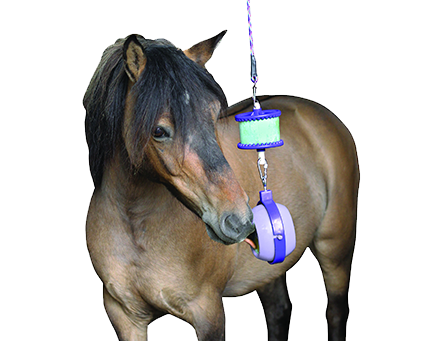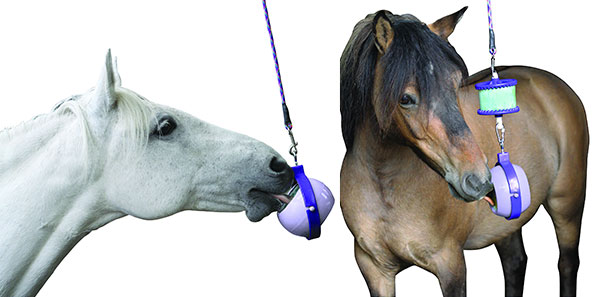
Keeping the Stabled Horse Happy
The Science
Horses and ponies are often kept in conditions that suit us, not them! Frequently they are kept in isolation in a single loosebox with little interaction with other animals and with limited access to the outdoors. The result of this is that don’t get the chance to perform normal horse-like behaviour and develop vices such as crib-biting, box walking, wind-sucking etc.
Horses like to play! This behaviour is more visually obvious in the young of all herbivorous species such as lambs, calves and foals. But adults like to play too! Nowadays, it is understood that play behaviour is of great importance to an animals well-being and a result we are now actively encouraged to ‘enrich’ the stable environment. Allowing horses or ponies kept in stalls to play with ‘toys’ increases the diversity of their environment, thereby reducing the seeming monotony of the stable.
Likits in their various forms act as enrichment devices within the stall and can relieve the boredom experienced due to its limited environment. A word of warning though as the horse gets used to the toy it may lose some of its “appeal”. Therefore, it is beneficial to alternate the different Likit flavours and position of the toys to keep the horse continuously stimulated. Thus, you will be most effective in improving the animal’s environment.
In the wild horses would have had access to many different types of forage and it has been clearly shown that the provision of different forages within the stable can help to enrich the horse’s environment. Likits provide another feed choice in the stable that the owner can “mix and match” using different flavours and nutrient sources.
Studies have shown that horses will spend quite a lot of time licking the Likit and this oral behaviour may be regarded as a form of ingestive behaviour. Thus, the horse is extending the time it spends eating in the stable and reducing the time it spends being inactive. Thus, it is less likely to develop abnormal behaviours such as crib-biting and box walking.
In summary,Likits may be regarded as fulfilling three functions:
1. They are a source of nutrients (eg.,Sport Likit)
2. They are a means of extending the time the horse spends licking & chewing, similar to grazing behaviour
3. A way of enriching/improving the environment in the stall
Dr Derek Cuddeford BSc, MSc, PhD
(Royal Dick School of Veterinary Studies, Edinburgh University, Scotland, UK)


